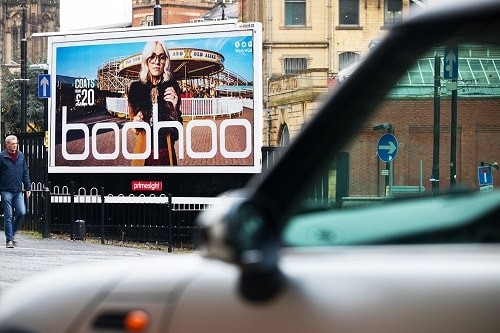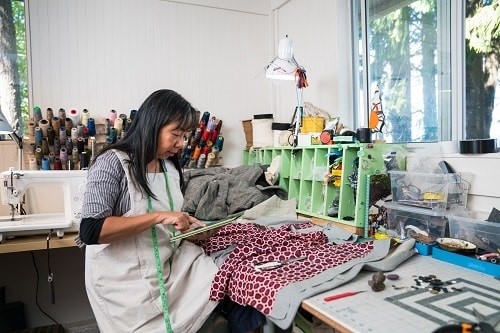How the UK’s garment workers have been let down by the very system which claimed to protect them – and what needs to change.
Features
A slave to fashion? The campaign to reform the garment industry
Covid-19 should be a defining moment for protecting the UK’s garment workers.
As Leicester went into the first local lockdown in June this year, the city’s garment industry was thrust into the spotlight.
The furore followed a new report by Labour Behind the Label detailing worker accounts that factories in Boohoo’s supply chain failed to protect them during the Covid-19 UK lockdown.
Workers alleged that some factories continued to operate at 100 per cent capacity, with no provision of PPE or implementation of social distancing measures. Alarmingly, some workers were told to continue working after testing positive for coronavirus and warned
not to tell their colleagues, or face losing their jobs.
At one factory, employing over 80 people, there have been around 15 Covid-19 cases, including the supervisor. In addition, workers reported conditions of modern slavery, illegally low wages, cases of furlough fraud and wage theft. As the media attention increased around the report, consumers and campaigners are left asking how the UK’s garment workers have had to endure such appalling conditions.
 Meg Lewis, Campaigns manager at Labour Behind the Label
Meg Lewis, Campaigns manager at Labour Behind the Label
Reports of inadequate working conditions in Leicester’s garment industry are not new. Poor health and safety standards were reported by the University of Leicester in 2015, while the Environmental Audit Committee in 2019 detailed serious risks, including accounts from one worker of padlocked fire safety doors. Many factories in Leicester are housed in old, dilapidated buildings, with little health and safety investment or modern ventilation.
Made in Britain
The ‘Made in Britain’ label stitched into fast fashion items may offer false reassurances to consumers, who assume that workers in the UK will receive at least the minimum wage and will be protected by the UK’s employment laws. In 2014, there was a concerted governmental effort to restore manufacturing, including textiles production, in the UK.
 Boohoo has enjoyed relatively high economic, social and governance (ESG) ratings, based on assumptions about labour conditions in the UK
Boohoo has enjoyed relatively high economic, social and governance (ESG) ratings, based on assumptions about labour conditions in the UK
This effort was due in part to the ‘good regulatory environment’ and ‘strong legal frameworks’ this country said it could offer businesses choosing to manufacture goods at home. Prior to June, Boohoo itself enjoyed relatively high economic, social and governance (ESG) ratings, based on an assumption that workers in the UK are at low risk of exploitative labour conditions. So how is it that workers in the UK have been failed despite protective legislation?
Secretive supply chains
The fast fashion ‘test and repeat’ model, which entails testing small batches, before repeating production of successful lines, encourages a system of subcontracting to unaudited suppliers in order to meet tight deadlines and low budgets. Complex and secretive supply chains make it hard to enforce regulations and monitor labour practices.
Although some brands are making progress in terms of transparency, others refuse to make their supply chains publicly available, which makes it difficult to link the finished garments with the workers or the conditions in which they were made.
Under the UN Guiding Principles on Business and Human Rights, businesses have a responsibility to prevent and remedy human rights violations within their supply chains. The framework clearly sets out responsibilities of brands like Boohoo to ensure worker safety, however, the lack of legally binding status frustrates efforts to hold brands to account.
Most garment workers in Leicester’s factories are from ethnic minority backgrounds. Around a third of workers were born outside the UK. Migration status, language barriers and higher levels of unemployment push workers to accept poor working conditions and illegally low pay, having little other option. One factory owner, speaking to the Financial Times in 2018, referred to Leicester’s garment industry as being detached from UK employment legislation, “a country within a country”. Workers in this situation are particularly vulnerable to exploitation.
HSE: a ‘lower risk industry’
During the Covid-19 crisis, while many employers took steps to protect workers through the furlough scheme or remote working arrangements, many low-paid workers in manufacturing roles were not afforded these same protections.
In May, as businesses started to reopen following easing of the lockdown, the prime minister advised that the Health and Safety Executive (HSE) would undertake spot inspections and monitor safety in operating businesses.
However, our sources tell us that workers were not aware of any inspections taking place during the lockdown, despite their concerns being relayed to HSE. In fact, HSE had ceased proactive inspections to reduce the risk of infection for staff and workers in March, only restarting inspections in high-risk industries in late May. As HSE categorises the textiles, footwear and leather industry as a ‘lower risk industry or declining industry with (relatively) few at risk’, the enforcement approach is generally reactive, rather than proactive.
The pandemic exposed and exacerbated many of the cracks in our current system, and inspections from HSE is no exception. HSE, along with many other regulators, has faced cuts since the coalition government took charge in 2010. In 2011, the regulator was told to cut proactive workplace inspections by a third.
 HSE categorises the textiles industry as a ‘lower risk industry or declining industry with (relatively) few at risk’
HSE categorises the textiles industry as a ‘lower risk industry or declining industry with (relatively) few at risk’
Workplace safety takes greater importance during a public health crisis, and unions have called for increased HSE inspections and greater transparency during the pandemic. Currently the system is secretive and labour rights groups have little way of knowing how many reports workers have made, and whether they have resulted in investigation or enforcement.
Workers’ rights groups have consistently warned that garment supply chains in the UK and the global South are unsustainable, relying on a system of illegal wages, and poor health and safety enforcement in order to keep costs down, while increasing production, maximising profits and encouraging more and more consumption.
Yet experience shows us that significant action is often only taken following a tragedy – such as the case of the Bangladesh Accord, a legally binding agreement to implement health and safety standards in Bangladeshi garment factories, established following the Rana Plaza factory collapse, which killed 1,134 workers. After a decade of reports of exploitation, illegal wages and unsafe conditions in UK garment factories, the government cannot afford to wait for tragedy to strike before taking action to protect garment workers.
Labour Behind the Label is calling on the government to increase resources and funding to strengthen enforcement of UK employment law and introduce binding legislation to hold brands to account when sourcing from unsafe factories, both in the UK and abroad. The first step to holding brands to account for the conditions in which their clothes are made is through greater transparency, and the government must make supply chain disclosure compulsory for companies, on at least an annual basis.
In addition, brands and governments must take robust action to reform purchasing practices, ensuring that suppliers receive enough to pay workers at least the minimum wage, progressing to a living wage. The coronavirus crisis has laid bare life-threatening inequalities in the garment industry, this must galvanise meaningful action to ensure that workers are not paying for the nation’s fashion habit with their health or their lives.
Meg Lewis is campaigns manager at Labour Behind the Label
FEATURES

Noise control: what I wish employers knew before making the big spend
By Gill Cussons, UK Hearing Conservation Association (UKHCA) on 02 February 2026
Employers often spend significant sums attempting to reduce noise levels from plant and machinery without first considering lower cost, but often more effective approaches, such as properly maintaining mechanical parts like guards, fans and compressed air systems.

Beyond awareness: how companies can support hearing protection behaviour
By Dr Dalia Tsimpida, University of Southampton on 02 February 2026
Workers often fail to wear hearing protection in noisy environments, but there are some simple steps employers can take to boost wear rates – and prevent devastating hearing damage.

Risky business – how to future-proof your organisation and get ahead
By Ian Cooke, British Safety Council on 02 February 2026
Forward-thinking organisations regularly update their plans for responding to events posing major business disruption, and existing emergency procedures for challenges, such as fire, provide a useful template for an effective business continuity strategy.



